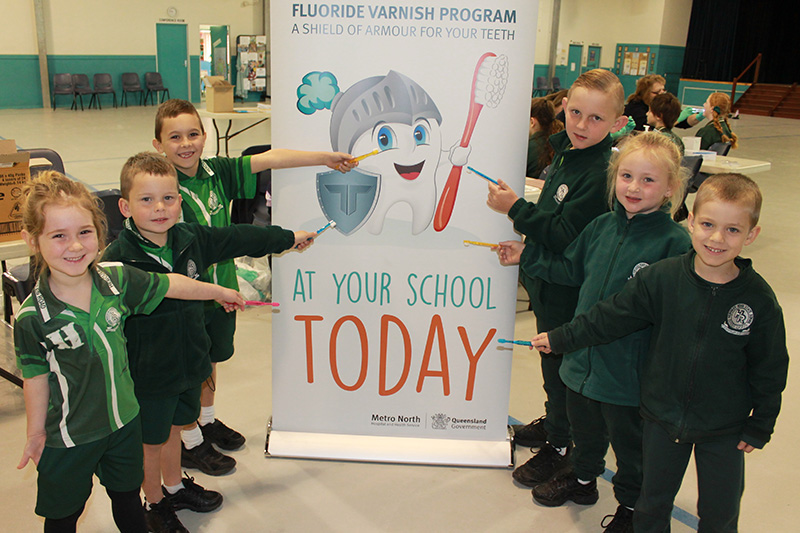Healthy smiles for Kippa Ring kids

The Metro North Hospital and Health Service Fluoride Varnish Program is helping to prevent tooth decay and teaching our kids about looking after their teeth. Hercules Road State School students Evelyn, Kai, Max, Max, Emily and Liam think the program is tops.
Kippa Ring school students are learning how to prevent tooth decay and take care of their teeth through Metro North Hospitals and Health Service’s Fluoride Varnish Program.
Staff from the Metro North Oral Health team recently visited Hercules Road State School to chat with kids from Prep to Year 6 about simple preventative dental treatment.
Oral Health Therapist Consultant Alison Dickinson said the Fluoride Varnish Program had grown from only Morayfield East State School in 2015 to 19 state and special schools in the Caboolture and Redcliffe areas.
“The program targets children from low socio-economic areas who had limited access to preventative oral care and are at risk of poor dental behaviours,” Alison said.
“Evidence shows that a community-based Fluoride Varnish Program is a cost effective preventative measure that can reduce decay rates in children by up to 37 per cent.
“The Caboolture and Redcliffe areas are among the most socially disadvantaged in Australia. We know that by the time they reach school age young children living here have over three times the odds of experiencing dental decay than children living in more advantaged areas.”
The Metro North’s Fluoride Varnish Program is simple to implement because it doesn’t require the children to attend a dental clinic; a multidisciplinary team of dental therapists, oral health therapists and dental assistants visit the children at their school.
“We needed to shift the focus from treatment to preventative measures. The evidence is there that applying fluoride varnish to young children’s teeth is safe and it works,” Alison said.
“We see the kids where they learn and play to provide them with oral health education and apply the varnish to their teeth.
“They are seen in groups in their own environment where they are comfortable. They are with their friends and because minimal dental equipment is needed the littlies don’t get frightened.”
The program provides a dental referral pathway to public sector oral health care facilities and other children in the family are welcome to attend with their sibling.
“They also learn how to brush their teeth properly. As well as improving their brushing skills, they get a toothbrush and fluoride toothpaste to take home,” Alison said.
“This program also helps us to reach out to a bigger audience. It has introduced us to a lot of children that we hadn’t seen before and we have found some cases where children had urgent need for referral.”
While continuing to provide dental care to children across the Metro North region, the team is now reviewing the effectiveness of the program in targeting different stages of dental development in kids.
